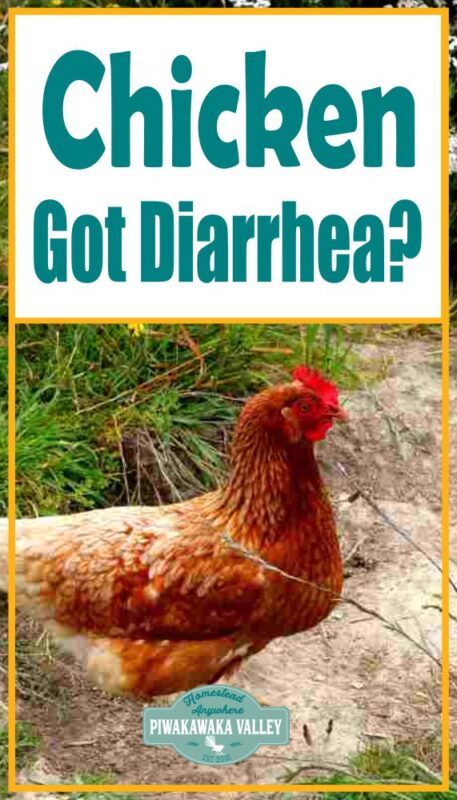This post was most recently updated on April 1st, 2021
Sick chickens are no joke, and they can die quickly if you do not treat them rapidly. Chickens, like most poultry, can develop diarrhea for a variety of reasons. In this post we look at how to tell if your chicken has diarrhea, common causes for diarrhea in chickens, and look at some helpful chicken diarrhea home remedy ideas.
Please read: This information is provided for educational purposes only and is not intended to treat, diagnose or prevent any disease. We encourage you to make your own health care decisions in partnership with a qualified health care professional.
This post contains affiliate links, this means at no extra cost to you, we make a commission from sales. Please read our Disclosure Statement
What does normal chicken poop look like?
Chicken droppings vary significantly during the day and can change color, consistency, size, smell and shape several times over the course of a week.
It is difficult to diagnose diarrhea in chickens until you know what their normal poop looks like.
For more photos of chicken droppings, this link has helpful images.
Day time chicken poop
During the day your chickens poop should be greenish and well formed. If you are brave enough to pick it up, it holds its shape and will roll around on your palm.
It is common to see white deposits in the manure, this is the uric acid salts produced by their kidneys. Chickens do not have a bladder and cannot urinate, so they pass the salts out with the poop.
Depending on the weather, what your chicken has been eating or drinking, these may also be less formed, and sometimes even foamy.
Cecal Chicken droppings
Every 8-10 droppings your chickens will pass what are known as cecal droppings. These are passed from the cecum (caecum) and are usually more sloppy and smell terrible. Chickens will usually pass more of these at night time as they do half of their pooping while they roost.
Chickens with red or rust brown in their droppings
If you notice reddish or rusty brown areas in otherwise normal, healthy looking manure, this is simply intestinal lining shedding which is perfectly normal.
Alternatively, coral pink colored urates are also normal in the white caps of the poop.
If you notice streaks or clots of blood, this is not normal and it needs investigated further.
What does diarrhea look like in chickens?
A chicken with diarrhea will usually also be acting unwell.
Clinical signs include:
- Being off her food/ not eating
- Avoiding drinking or
- Drinking excessively
- Listlessness
- Lethargy
- Tucked down tail
- Sitting with her eyes closed
- Messy bottom
The droppings of a chicken with diarrhea are very watery and smell bad. They may have some formed lumps in them, but are predominantly liquid. It can be difficult to tell the difference between diarrhea and the normal, looser cecal poops. The best way to check is to move your hen to a clean dry place with a clean floor and look to see if any of her droppings are well formed, or if they are all loose and watery.
Bloody diarrhea is always a sign that your hen is unwell, and she should be isolated from the flock while she is being treated and recovering.
It is worth noting that watery droppings can also be produced by hens which are too hot. It can be a way for them to cool down by drinking a lot and losing some of their heat in frequent wet droppings. It can also be a sign that the hens are not eating enough.
What Causes Chicken Diarrhea?
There are many causes for chicken diarrhea and if you are worried about your chicken it is best to take them to a vet to get them looked at. Take a sample of the poop that is causing you concern as well.
1. Overheating
Overheating can cause diarrhea in chickens quite quickly
SYMPTOMS
A hen that is overheating will be very thirsty. She will drink excessively which will overwhelm her kidney allowing the water to pass straight through her gut.
The water is cool when it goes in to her body, it warms up on the way through and passes out the other end as a very liquid stool.
TREATMENT
A chicken suffering from heat stroke/ overheating will die if she gets too hot. The best treatment is prevention – always give adequate space, shade, sun protection and ventilation to your chickens.
If you have a hen suffering from overheating, place her in a tepid (not cold) bath and keep her there for 10 minutes. Then move her to somewhere warm but not hot to dry off.
Once dry place her somewhere well ventilated and out of the sun, with plenty of water to drink.
2. Hardware Disease
This is not so much an illness and more of a mechanical cause of a digestive upset. Chickens are quick to eat things that look delicious before anyone else gets it. This means that they are more likely to accidently eat small metallic items like screws and nails which can cause all sorts of problems, including an upset stomach.
TREATMENT
Again, prevention is the best cure. Be sure that your chickens do not have access to small metal things that they should not be eating. If you do suspect this is the issue, an x-ray from the vet is your best course of action, as these sharp metal objects can puncture important organs and cause catastrophic bleeding and blockages.
3. Food changes
Changing an animals diet too quickly can lead to an upset stomach. This will typically self resolve in a few days.
SYMPTOMS
Diarrhea in otherwise healthy birds coinciding with a change in their diet.
TREATMENT
Keep them well hydrated, and consider mixing in some of their old feed to transition them slowly.
4. Food poisoning
Chickens don’t get food poisoning like humans do, and they have a robust gut capable of eating all sorts of things that would make a human sick however, they can be poisoned by what they do eat.
Chickens are pretty good at naturally avoiding toxic foods and plants. They apparently can only taste bitter things and lack most other receptors for flavors on their tongue. Most toxic foods are highly bitter and a chicken may take a small taste, but will stop there.
Hungry chickens may eat toxic substances or plants due to their hunger, so be sure to always provide ample, safe food for your flock.
An excess of salt in their diet (like if they eat homemade playdough) will cause them to drink huge volumes of water and they will get diarrhea from this as their kidneys work overtime to process all the salt. If their kidneys are functioning well, and they have adequate access to water, this will self resolve in most cases.
Plants like hemlock, nightshade and foxglove in small volumes will give your chickens an upset tummy, and in large volumes, kill them.
SYMPTOMS
Chickens will be off their food, lethargic and generally unwell as well as probably having diarrhea.
TREATMENT
Remove the hen from the flock and place her somewhere warm and dark. Give her plenty of water with electrolytes and some of her normal grain feed. Keep her like this until she recovers.
5. Antibiotics
Many bacterial illnesses can be cured with antibiotics, however, it is worth noting that antibiotics can cause a disruption in gut microbiota and may cause diarrhea as well. If this the case, support your hen’s recovery by providing her with plenty of electrolytes and a probiotic.
6. Illness
There are many chicken illnesses that can cause diarrhea. Some they will recover from, others are fatal. If you have a sick chicken it is important to find out what illness you are dealing with so you can ensure you are treating them correctly.
As with many things prevention is better than cure. Be sure to vaccinate your chickens against whatever illnesses are common in your area, regularly worm your flock, and if coccidiosis is an issue where you live, consider giving a coccistat a few times a year to avoid a break out.
Generally the treatment if your chicken has acute diarrhea, is to remove the infected bird from the flock and place her somewhere warm, dark and dry. Provide her with electrolytes, a bland diet of her normal chicken feed only, and keep her clean until she recovers. She would also benefit from probiotics that supports the natural bacterium balance in her gut as she recovers.
Wash your hands immediately after touching your hens, their enclosure or coop, or their eggs. Make sure to change your clothes after spending time in your chicken’s run, and do not wear your soiled shoes indoors.
Occasionally you will find a hen that is otherwise well, but has chronic diarrhea, if all others have been ruled out, this is a possibility.
A list of known viruses with diarrhea symptoms is:
- Infectious bronchitis
- Marek’s disease
- Lymphoid leukosis
- Fowl cholera
- Avian tuberculosis
- Exotic Newcastle disease
Fowl Pox
If your chicken has been infected with fowl pox keep her in isolation from the rest of the flock. Give her plenty of fresh food, a balanced grain feed and fresh water. Adding apple cider vinegar and crushed garlic to her water will help support her immune system while it fights off the virus. Keep her warm and dry, and in a low stress, darkened environment. It usually takes about three weeks for the virus to run its course.
If fowl pox is an issue in your area, it is recommended that you vaccinate against it.
Worms
Intestinal worms in chickens can cause diarrhea. There are many types of worms that can infect chickens, and the best method is to routinely de-worm your chicken flock to avoid outbreaks.
If you notice one chicken with symptoms – usually either worms or oocysts (eggs) found in the faeces – you should treat your whole flock and repeat it again in 7-10 days.
Follow the instructions exactly and make sure not to eat or sell eggs from the treated hens for the specified length of time.
Coccidiosis
Coccidia are a small, spore-forming parasite that can attack different parts of an animal. They are easily killed if caught early with synthetic vitamins (thiamine) sold as Amprolium. Left untreated they will cause diarrhea and eventually death.
Coccidiosis affects the intestinal lining and integrity of the gut. It impairs the ability to absorb nutrition causing weight loss. Anemia can be severe from bloody diarrhea. It is more common in chicks under 10 weeks or rescue hens from battery operations.
Infectious coryza
This is caused by a bacterial infection that infects the upper airway of birds. It can be easily treated with antibiotics, but she may also suffer from diarrhea. Support her as above.
The Best Cure – our chicken diarrhea home remedy
If your poor chicken is suffering from loose stools and you are looking for a home remedy to treat her at home, or to help support her while she heals, I have put together our home remedy cure.
1) Isolate
If you have a chicken that is unwell, you should move her away from the rest of the flock.
2) Keep comfortable
Keep her at a comfortable temperature, out of wind, rain and the sun. A darkened environment helps keep her feeling calm and safe. Change the bedding often, removing the soiled bedding as required.
3) Diagnose
The best treatments happen when you know what you are dealing with, is it a parasite? Bacterial infection? or is it one of the other common chicken diseases? This is best left up to your veterinarian.
4) Treat
If it is bacterial, your vet will prescribe some antibiotics – there are also some natural antibiotics that have been shown to work in chickens.
5) Support
This is where the natural remedy really comes in to its own.
Provide your affected bird with a plain, grain based, balanced diet. Add a few drops of oregano oil to their feed twice a day, it is a natural antibiotic and it helps support their immune system.
Make up a batch of chicken electrolytes and give it to her instead of water.
Add chicken probiotics to their food or water.
Avoid dairy products as they can make diarrhea worse.
Keep your chicken in her chicken hospital until you see 24 hours with normal bowel movement.
Electrolytes
Electrolytes help chickens to recover from illness and stress faster and better. If a is not eating, has diarrhoea, has been over heated, or dehydrated then electrolytes in the water are helpful.
You can buy ready made electrolyte mixes or you can mix the recipe below. Use in place of drinking water for one week.
RELATED POST: Natural dust bath
Chicken electrolyte recipe
1 teaspoon of potassium chloride (litesalt or nosalt)
1 1/2 teaspoons of baking soda
3 teaspoons of table salt
Dissolve in 3 quarts/liters of warm water. Use in place of water for one week.
If you have a sick chicken with an upset stomach, these natural remedies will help ensure she recovers quickly.
.
Please be sure to pin and share!









